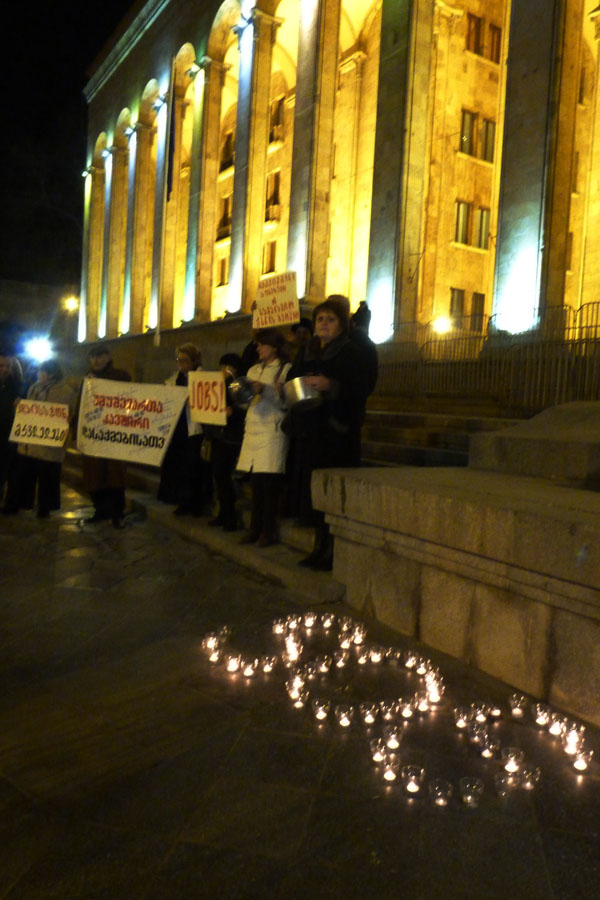
Refugees have organized themselves and ask for an allowance it is possible to live on. (Photo: Mari Nikuradze.)
TBILISI, DFWatch – The Georgian Public Defender gives priority to the problems of internally displaced persons (IDPs).
Giorgi Tughushi presented his annual report on human rights in Georgia, which in details describes problems faced in different areas, like the prison system, refugees, women and children’s rights, and disabled persons.
Tughushi says the number of IDPs complaining to his office has increased compared to the previous year.
One of the main problems for refugees in Georgia is living quarters and housing conditions. They face privatization problems and often the legal status of refugees’ living quarters is unclear and the process drags out.
A large section of IDPs are still waiting to be moved to permanent housing, after having had to do with temporary accommodation for more than 15 years.
The majority of refugees from the Russia-Georgia war in 2008 live in cottages. The Public Defender’s report says that they have problems with heating and water in winter. In addition, the majority are facing unemployment.
IDP’s Civil Society, a non-governmental organization, speaks about the same problem of refugees not having stable working places. A few days ago, the organization held a small rally in front of the government building demanding that the IDPs allowance be increased to a level it is possible to life on.
They have from 22 to 28 lari (up to USD 16) social assistance, while the majority doesn’t have insurance and socially excluded package.
“Prices for vital products are catastrophically high,” says Manuchar Sigua, head of IDP’s Civil Society. ‘IDPs assistance is only 22-28 lari, which in fact means starvation.’
Nunu (51) has lived in Tbilisi since the conflict in Abkhazia, Georgia’s breakaway region. She has changed number of living places in Tbilisi. None of them were officially privatized. She was resettled from two living places of different districts of the city.
Finally she settled in one of suburbs of the capital.
Twin red brick buildings have been standing in that place for more than twenty years. Constructions of these houses started in Soviet times. After independence the government finished only one building leaving another one just in frames.
“I came here with my son and started building walls on the first floor, like an ordinary flat. I’ve built a home for me and my son, now they want to resettle us somewhere in a village I haven’t even heard of.”
Nunu has a small garden with pigs, chickens, turkeys and ducks, also a small yard where she grows vegetables in summer. She sells corn on the market and for extra money makes ear rings for girls in her district.
Construction work on the building were restored a few years ago. She tried to privatize her flat on the first floor but the process dragged out. Now she is about to be resettled to the villages, just like many other IDPs in the capital.
A part of them have already moved there, and as Civil Society of Refugees describes it, there are terrible living conditions there. People who have lived for years in the city get trouble finding new jobs; in addition there are water, heating and sewage problems.
In winter communal fees increase, this makes it difficult for them to pay. Both living in villages and cottages face problem of not having access to health care, the report says. There are no medical points in cottage settlements. Sometimes IDPs have to travel miles to the next city to buy medicines.
The report reviews the condition of people affected by natural disasters, so-called eco-migrants. As DF Watch previously reported one of main problems in this regards is that the term of Internally Displaced Persons in Georgian legislation doesn’t take into account people displaced by natural disasters.





Leave A Comment
You must be logged in to post a comment.